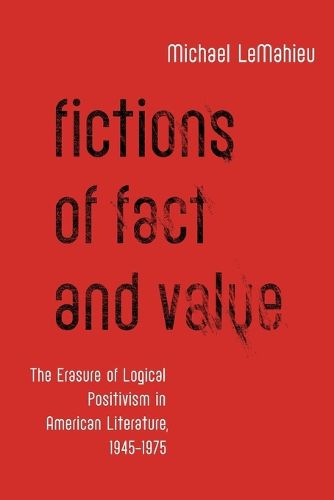Readings Newsletter
Become a Readings Member to make your shopping experience even easier.
Sign in or sign up for free!
You’re not far away from qualifying for FREE standard shipping within Australia
You’ve qualified for FREE standard shipping within Australia
The cart is loading…






Fictions of Fact and Value argues that the philosophy of logical positivism, considered the antithesis of literary postmodernism, exerts a determining influence on the development of American fiction in the three decades following 1945. Two particular postwar literary preoccupations derive from logical positivist philosophy: the fact/value problem and the correlative distinction between sense and nonsense. Even as postwar writers responded to logical positivism as a threat to the imagination, their works often manifest its influence, specifically with regard to ‘emotive’ or ‘meaningless’ terms. Far from a straightforward history of ideas, Michael LeMahieu charts a genealogy that is often erased in the very texts where it registers and disowned by the very authors that it includes. Reading works by John Barth, Saul Bellow, Don DeLillo, Iris Murdoch, Flannery O'Connor, Thomas Pynchon, and Ludwig Wittgenstein, Fictions of Fact and Value will interest anyone concerned with postmodernism, modernist studies, analytic philosophy, or the history of ideas.
$9.00 standard shipping within Australia
FREE standard shipping within Australia for orders over $100.00
Express & International shipping calculated at checkout
Fictions of Fact and Value argues that the philosophy of logical positivism, considered the antithesis of literary postmodernism, exerts a determining influence on the development of American fiction in the three decades following 1945. Two particular postwar literary preoccupations derive from logical positivist philosophy: the fact/value problem and the correlative distinction between sense and nonsense. Even as postwar writers responded to logical positivism as a threat to the imagination, their works often manifest its influence, specifically with regard to ‘emotive’ or ‘meaningless’ terms. Far from a straightforward history of ideas, Michael LeMahieu charts a genealogy that is often erased in the very texts where it registers and disowned by the very authors that it includes. Reading works by John Barth, Saul Bellow, Don DeLillo, Iris Murdoch, Flannery O'Connor, Thomas Pynchon, and Ludwig Wittgenstein, Fictions of Fact and Value will interest anyone concerned with postmodernism, modernist studies, analytic philosophy, or the history of ideas.